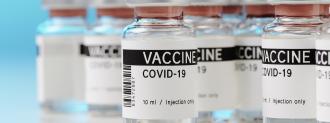Pharmaceutical giant Pfizer is developing four coronavirus vaccines — but it may have struck gold on the first try.
On July 1, the company released the preliminary results for its first coronavirus vaccine trial, and based on the available data, Pfizer’s COVID-19 vaccine appears to have triggered a strong immune response in study participants.
Pfizer’s COVID-19 vaccine appears to be both effective and tolerable.
“Our first vaccine candidate is eliciting antibody levels to neutralize the virus that is equivalent to or better than what you see in people who have had COVID-19,” Phil Dormitzer, a Pfizer vaccine developer, told ABC News.
This news means Pfizer and its partner, German company BioNTech, are still on track to produce 100 million doses of a coronavirus vaccine in 2020, according to Dormitzer.
“The goal that we’ve set is to distribute millions of vaccine doses in 2020 and executing on that, of course, means everything has to go well,” he said. “We need the regulatory approval to do so. But that is our plan.”
Pfizer’s COVID-19 Vaccine
Pfizer enlisted 45 healthy adults, ages 18-55, in its combined Phase 1 and 2 vaccine trial. Nine of the participants received a placebo. The rest were divided equally into three groups that received 10-microgram, 30-mcg, or 100-mcg doses of the vaccine.
Three weeks later, Pfizer gave participants in the 10-mcg and 30-mcg groups a second dose of the vaccine. Those in the placebo group received another dose of the placebo.
(The 100-mcg group didn’t receive a second dose of anything, as about half of them experienced a fever after the first shot, suggesting that dose was too high.)
Seven days after receiving the second dose of Pfizer’s COVID-19 vaccine, the people in the 10-mcg and 30-mcg groups had levels of coronavirus antibodies in their blood that were high enough to neutralize the virus, according to Pfizer’s study, published on the preprint server medRXiv.
None of the participants suffered severe side effects, though more than half of those who received a second dose did report some kind of adverse reaction, such as a fever or sleep disturbance.
Pfizer is now seeking approval to begin a combined Phase 2b and 3 trial, involving up to 30,000 healthy participants in late July.
A Scalable Coronavirus Vaccine
This is all good news, as it suggests Pfizer’s COVID-19 vaccine tends to be both effective and tolerable. However, there are reasons to temper expectations.
The results of the trial have yet to be peer-reviewed, and the sample size was small and limited, meaning we don’t know if the vaccine would have the same antibody-generating effect in minors, seniors, or pregnant women.
The goal that we’ve set is to distribute millions of vaccine doses in 2020.
Phil Dormitzer
There is one other big reason to be hopeful about this vaccine, though.
Like the vaccine that Moderna is currently developing, Pfizer’s COVID-19 vaccine uses a gene-based technology, called messenger RNA, to prompt the creation of antibodies.
This type of vaccine is extremely new — the FDA has yet to approve a single mRNA vaccine — but it would be far easier to produce in large quantities than most other types of vaccines, meaning that Pfizer’s goal of manufacturing 1.2 billion doses in 2021, while ambitious, is potentially achievable.
We’d love to hear from you! If you have a comment about this article or if you have a tip for a future Freethink story, please email us at tips@freethink.com.

